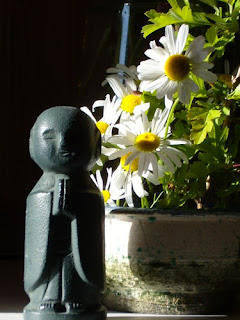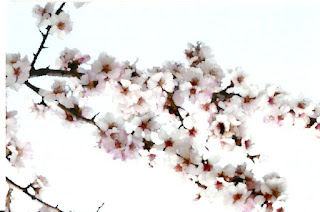Laver
un corps toujours pur
Discours
tenu dans la Salle du Dharma, pour le Bain anniversaire du Bouddha
Quand
le M° Zen Hongzhi ( jap.Wanshi) était Supérieur de Tiantong, dans
un discours fait lors du bain du bébé Bouddha, il dit:
" Ceci
est l'eau complètement claire de la vacuité de la nature du soi; le
corps parfaitement brillant de la pure sagesse.
Nous
n'avons donc pas besoin de laver ce corps; il n'y a pas un grain de
poussière qui existe.
Ainsi, il devint Bouddha, vainquit les démons,
atteignit l'autre rive et quitta cette rive de l'illusion. Ce
parler-bébé « baba-wawa »1
était au début , et cette promenade en rampant au hasard devint la
cause ( de devenir Bouddha).
En
cette occasion, Shakyamouni Bouddha, ne te mets pas en colère si
nous versons de l'eau polluée sur ta tête.
Pourquoi ne pas invoquer
le pouvoir d'2Avalokiteshvara,
et naturellement cette insulte rebondira vers celui qui en est à
l'origine.
Personnes
pleines de bienveillance, qu'en est-il juste quand la louche ( pour
verser l'eau sur le Bouddha) est dans votre main?
Sans étudier,
nous ne pouvons pas développer la moindre sagesse."
" Cet ancien Bouddha, mon oncle du Dharma, était de la
branche de Daokai.
Moi, Eihei, descendant de Wanshi, j'ai composé
ces vers:
Au
moment de sa naissance, trois mille mondes tremblèrent.
Sur
le lieu de son éveil, 80.000 portes se sont ouvertes en grand.
Verser
de l'eau sur la tête de son corps toujours pur,
Est
une mise en scène d'une embarrassante sincérité.
Eihei
Kuroku (1248) M° Dogen
April - Buddha's Birthday Assembly by Issho Fujita
https://global.sotozen-net.or.jp/eng/library/sermon_archive/201104.html
 Zen master Daichi (1289-1366) wrote a verse entitled "Buddha's Birth."
Zen master Daichi (1289-1366) wrote a verse entitled "Buddha's Birth."
"In Jambudvipa, there are eighty-four thousand castles.
Without using any weapons such as swords and shields, great peace is created.
We capture Gautama, a daylight thief, alive.
So we do not bother to give him a blow with a stick, as Unmon once said."
In Indian cosmology, Jambudvipa is considered a human world.
It is said to be filled with 84,000 earthly desires
which cause us to suffer. These earthly desires are likened to "castles"
in this verse. We tend to think that our practice is to attack and
destroy those castles, believing that we can never attain awakening
unless we extinguish all earthly desires.
The Buddha was born into Jambudvipa in order to teach
us that that is not the case. He showed us the way to live in peace
without resorting to battle against the castles of earthly desires.
He
never taught how to invent and use weapons to destroy them.
True peace
is not possible so long as we rely on weapons.
Chinese Zen master Unmon once blamed the Buddha for
tricking us like a wily thief by talking about delusion and
enlightenment as if they exist separately.
So we started a kind of
spiritual war against delusion for the sake of enlightenment.
According
to Unmon, Gautama made uncalled-for statements only to misguide us to
practice as though we were at war.
He said, "If I had been there when
Gautama was born, I would have given him one fatal blow so as to bring
peace back to the people's mind".
(Of course he is actually praising the
Buddha through an expression of reproach).
Zen master Daichi says that
if only we can capture the Buddha alive, we need not perform "Unmon's
one blow" to the Buddha to correct his error.
How is it possible to create great peace without using weapons? How can we capture the Buddha alive?
The answer is to sit zazen of shikantaza. In
zazen we do not fight against whatever happens to us. We do not apply
any method or technique as a weapon to win the fight. Instead we simply
accept it and naturally let go.
Zazen is to "cease fire" and to create a
profound peace within oneself and the world.
During zazen, "sitting-buddha" is being actualized in a
vivid way with our whole body-mind. In that sense a new Buddha is being
born moment by moment.
That is how we capture the Buddha alive.
In this verse of celebrating Buddha's birth, Zen Master
Daichi points out that the purpose of the Buddha's birth into this
world is to show us how to "bring about peace in our life without
fighting against our earthly desires."
And he suggests we practice and
realize it through zazen by which we "capture the Buddha alive."
As the
sixth descendant of Japanese Soto Zen tradition (Eihei Dogen--Koun Ejo--Tettsu Gikai--Keizan Jokin--Meiho Sotetsu--Gida Daichi), he tries to convey what zazen is all about by describing the significance of the Buddha's birth.
In our Soto tradition, we observe Buddha's
Birthday Assembly on April 8th to commemorate his birth. Sometimes it is
called "Hanamatsuri", meaning "Flower Festival", because he was born in
the flower garden in Lumbini.
As well as performing a solemn ritual and
sutra chanting, people also ladle ama-cha
(a tea prepared from a variety of hydrangea) on a small standing baby
Buddha statue in a pavillion with a roof decorated with flowers.
It is
also a day for us to remind ourselves how lucky we are to be born into
this world as a human being, because we can meet with wonderful
teachings and practices taught by the Buddha.
1 Ce « parler-bébé »:
fait réf. à la phrase « Moi seul suis Bouddha...»; de même
« en rampant au hasard » fait réf. aux sept pas faits
par le bébé Bouddha.
2« Invoquer
le pouvoir d'Avalokiteshvara, et naturellement cette insulte
rebondira vers celui qui en est à l'origine »
Ces mots sont
repris du chapitre sur Kanzéon du Sutra du Lotus: « La
porte universelle du Bodhisattva Kanzéon »








Aucun commentaire:
Enregistrer un commentaire